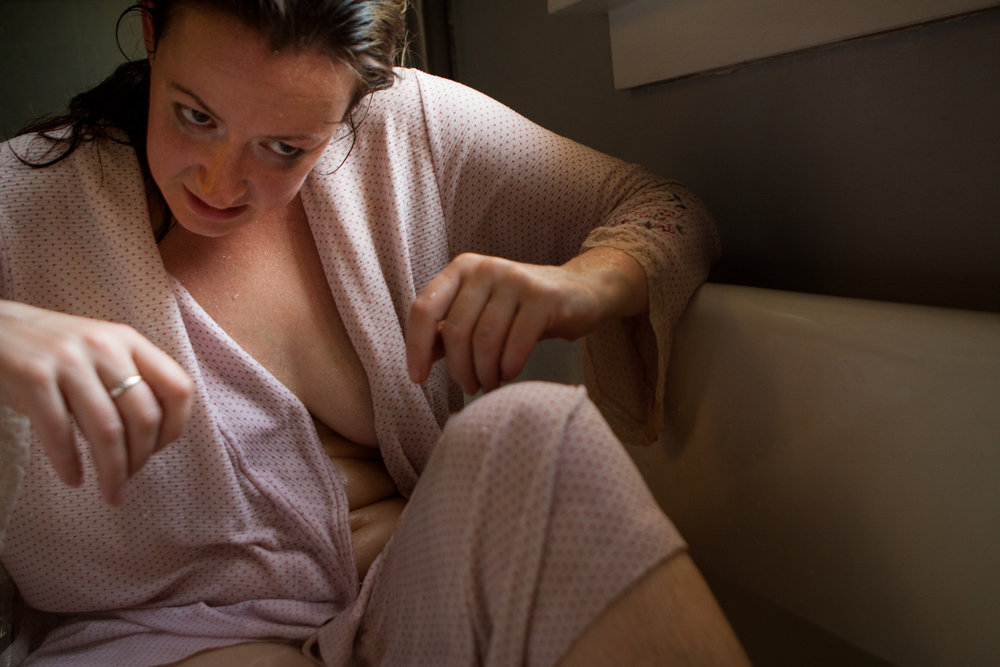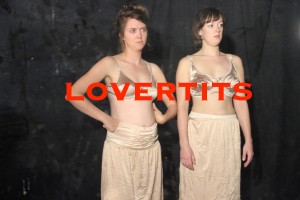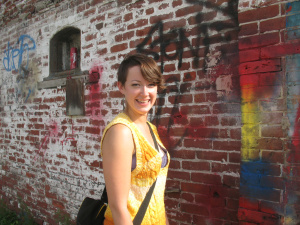With her works LOVERTITS and At Home with the Humorless Bastard, Annie Wilson established herself as one of the freshest, funniest, and most-fearless choreographers in Philadelphia. Playwright-director John Rosenberg continues his series of long-form interviews of varied creators and theater peeps with Annie. Find out more about her at theanniewilson.com.

John Rosenberg: Who are you?
Annie Wilson: Annie
John Rosenberg: Why did you say it like that?
Annie Wilson: It’s my name. I suppose since I am an independent artist with very little infrastructure, my name is also my BrAnD!
John Rosenberg: How did you come to be a performer?
Annie Wilson: I love this question because I am constantly wondering that myself. I’m currently theorizing that it’s a result of the type of family dysfunction I come from, which is wildly typical of WASP families slip-sliding along the middle-class spectrum. This type of dysfunction values performance-of-self in a very particular way. You know, there’s this real, hmmm… Faustian performance my family valued (probably at least several generations back): the silent agreement that if you perfectly perform race, class, and gender in a particular way, you’re able to move up in society. But what it took for our family to choreograph that performance caused an incredible amount of agony. There’s probably a word for this that I don’t know. There’s gotta be, some term that incorporates the word privilege. This dynamic is so familiar, I mean just watch any crappy play/movie/tv show getting undue accolades for portraying a family that has it all… but wait… there’s a dark side.
Anyway, learning the codes of “in-public” and “in-private” performance was one of the very first survival skills I learned. So I think I just hung with it, and my interest in it expanded beyond survival and desire for love and validation, to actually being interested in the mechanics of what’s actually going on there.

John Rosenberg: How many different versions of you are there?
Annie Wilson: Infinite might be a cliché response, but it’s true. In any given day, or moment in the lunar cycle I could probably identify 16 or so.
John Rosenberg: What did you do as a child you still do?
Annie Wilson: Hmm. Snuggle. Make dances with friends. Take bathtime super serious.
John Rosenberg: What do you experience in your head when you feel positive?
Annie Wilson: “Yeah, Wilson! You’re finally getting your shit together!” That’s the thought I most associate with the word positivity. To be a little more accurate, there is this sort of bubbling/quickening that happens right under my diaphragm when it feel like all the fabric of the universe is really knitting together in a way that makes some kind of sense. Luckily that sensation is not predicated on me feeling like I’ve briefly mastered time management.
John Rosenberg: What are some rehearsed anecdotes about your life you share with people to put yourself in a good light?
Annie Wilson: Oooh, this is a great idea. If I have them I’m not aware of what they are. Huh.
John Rosenberg: What do you do at the airport?
Annie Wilson: Run like the wind
John Rosenberg: How many bones have you broken?
Annie Wilson: Zero and I plan to keep it that way
John Rosenberg: What are you not interested in exploring in your work?
Annie Wilson: Not interested in proving that I’m smart. Not interested in proving that months ago I had a really good idea. Not interested in proving that I earned that grant (lol because I probably didn’t get it together in time to even apply). Not interested in exploration. Not interested in claiming process as my interest (even though it’s probably the only thing I’m interested in). Not interested in stating what I already now to be true. Not interested in saying something that makes the audience feel smart. Not interested in “saying something.” Not interested in alienating an audience. Not interested in pandering. Not interested in exploring the idea that just because dance is marginalized, simply putting it onstage is a radical act. After my last piece, I’m losing interest in feelings, but I doubt they’re losing interest in me.
John Rosenberg: What is your relationship with audiences? I ask that because the times I have seen you perform, you direct address the audience and make it clear you are aware we are all in the room.
Annie Wilson: I believe in a permeable, warm, flexible fourth wall that invites in, pushes out, draws the curtain, opens the blinds, blindfolds the viewer, performs like a mist, or a thunderstorm.
But generally, yes, we are all in the room. We don’t have to be friends but I can’t do a lot without acknowledging the basic truth of a room full of breathing humans.
John Rosenberg: How do you develop your work?
Annie Wilson:
- Set a deadline
- Ask as close to one question as possible
- Hang onto it like a wild dog that I somehow leashed while it leads me places I didn’t know existed
- Panic
- Scramble
- Showtime
- Repeat with small chunks 1-8 times before giving it its own evening/doing a press release
I’d like to eliminate Panic in my next process.

John Rosenberg: What is the closest you have come to seeing/feeling an idea in your head and then bringing it into being?
Annie Wilson: It was opening night of At Home with the Humorless Bastard and we were finishing lighting cues. I was about to run a section. Wait. Maybe it was a dress rehearsal. Or it actually was opening night. At any rate, there was this moment where I was onstage in the robe, walking amongst sonotubes, with the side lights hitting them. Whether I was performing or not, stage time evaporated and the moment accordioned out. In the particular constellation of lights, set, robe, and my body, I felt that I was in a Giorgio de Chirico painting. I was obsessed with Giorgio de Chirico in college. He was my absolutely favorite surrealist/metaphysicalist. But I hadn’t thought about him in 7 years, easily. The feeling that this moment produced is hard to describe. It was like 19-year-old me had created a mini time capsule of desire that I didn’t open for 12 years. Or that actually this moment was happening equally in 2005 in a south philly rowhome and in 2016 in Fringearts. I imagined myself waving to 2005 Annie as she desperately searched for the sort of art that she wanted to see and make.
But maybe I’ll add: I’m not interested in recreating an image I see in my head onstage. I find it super boring to work on, and pretty boring to watch. Head-images are really useful starting points, but then I find it better to work with what’s actually in any given room. Otherwise the work has a creepy, dead feeling, like bringing Norma Bates out onstage.
John Rosenberg: What was your first concert?
Annie Wilson: My sister brought me to No Doubt when I was 11, and it was, hands down, the coolest I have ever felt.
John Rosenberg: What kind of funny are you?
Annie Wilson: Definitely not the kind that utilizes impressions.
